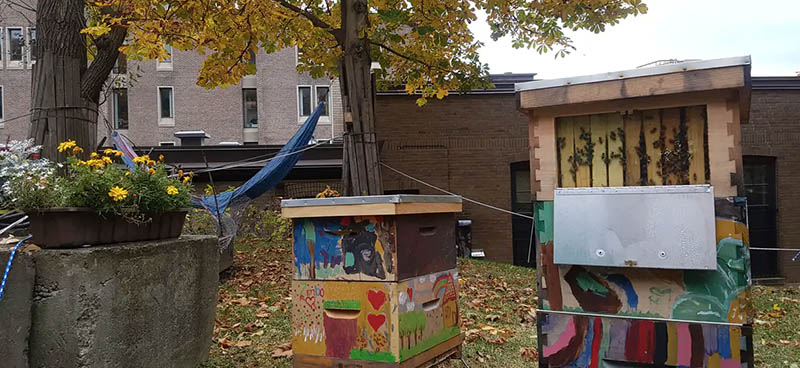
Youth rallied around the world in 2019, making it the year of global climate strikes. About six million protesters walked out of their classrooms and workplaces in a week of organized strikes and demonstrations in late September, calling on governments to address the escalating ecological emergency.
People’s frustration at the inaction of political leaders and corporations on the climate crisis is clear. But what more is needed if we are serious about striking to “disrupt the system“, as climate activists like Greta Thunberg have called for?
This need to disrupt and re-imagine our society sits at the core of our work addressing climate change and education in the faculty of education at McGill University. One practical project to realize this aim is a community partnership approach to developing and supporting school-community gardens. Through this project and others, we hope to transform Québec’s education system to better prepare students (and ourselves) for a fast-changing and uncertain world.
Beehives and garden at McGill University’s faculty of education. (Blane Harvey), Author provided
Learning across settings
Proponents of what’s called “systems leadership” argue that leaders must help people collaborate across different systems to tackle complex challenges like climate change. They stress the need for deep listening and efforts to see through others’ eyes that encourages the openness needed to allow new ways to emerge.
Fundamental transformation is needed to address the looming impacts of climate change. This transformation needs more than education, research or government policies alone.
Rather, we need strategies for harnessing our collective wisdom and learning together across settings and disciplines. Collaboration between the private sector, members of the wider public and researchers is imperative.
Unfortunately, many of our institutions remain siloed, hierarchical and therefore ill-equipped for the collaboration and flexibility needed to drive collective change. How then can we proceed? Based on recent research and experimentation, we see two closely related paths forward.
At the Cedar Street Elementary School in Beloeil, a suburb of Montréal, Kindergarten and Grade 4 students worked together to plant seeds to grow food with the aim of sharing it with the community.
Focus on bright spots
Large systems challenges like climate change are often likened to icebergs —daunting in their size and difficult to appraise. By shifting focus to smaller, more tangible challenges or bright spots, we can cultivate the relationships, ways of working and insights that can help us tackle larger challenges.
School gardens are a way of engaging students in experiential learning about their environments, food production and global environmental change. Many teachers, like their students, are keen to bring climate change and sustainability tools and topics into their classrooms. But they’re limited by a lack of financial and administrative support, a lack of preparation for teaching these issues and a lack of clarity on how their efforts fit into highly standardized curricular requirements.
As a result, these efforts are often relegated to extracurricular or optional activities led by a small number of educators doing it out of their own conviction (not to mention with their own time and money).
School-Community Garden Institute
Partnering with LEARN Québec, we co-host the School-Community Garden Institute. Gatherings bring together teachers, educational support workers, researchers, non-profits and businesses from around Montréal to share knowledge and resources on how to establish and sustain a garden.
Participants in the School-Community Garden Institute meet to share knowledge. (Blane Harvey), Author provided
Participants who joined were interested in expanding and improving their gardens, their partnerships and deepening knowledge of using gardens for learning and teaching. They wanted to connect with others with similar interests.
The meetings foster mutual learning and collaboration. Participants examine the many dimensions of school-community gardens that must fit together to ensure success: fundraising, community engagement, planting and tending to the garden, planning lessons, developing curriculum and more.
Peer-to-peer problem solving
We share examples of what’s going well. In facilitated peer-to-peer problem solving sessions, attendees from quite different contexts bring their collective knowledge to bear on real-world challenges. We host these events at McGill University using the faculty’s community garden as a collective space for knowledge exchange and innovation.
These collaborations have generated much richer understandings of the realities faced by those bringing gardens to life. They’ve also advanced a shared commitment to grow the conversation.
Together we’ve addressed strategic challenges like funding, engaging other teachers and community partners, as well as practical issues like building raised garden beds. Participants’ roles evolve from seasoned expert in one moment to curious learner in another.
Universities as innovation brokers
As the case of our garden institute illustrates, Canadian universities enjoy the networks, public trust, infrastructure and convening power needed to facilitate knowledge sharing and to scale up collective action.
Mitchell McLarnon, PhD candidate and project lead of McGill’s community garden, guides participants in planting garlic cloves for the winter. (Blane Harvey), Author provided
Our work seeks to promote a model where universities serve as community meeting places that bring together diverse sources of knowledge and experience to catalyze collective action —as “innovation brokers“.
Innovation brokers create and influence contexts to facilitate mutual learning and innovation. They strive to connect like-minded partners, stimulate out-of-the-box thinking and encourage mutual learning and knowledge exchange among people who might not otherwise have the opportunity to work together.
Re-thinking how universities work
For universities to become innovation brokers in significant ways, however, we must rethink how universities work. Universities will need to move from being the main architects of innovation to being brokers of diverse knowledge.
Policy-makers, administrators and researchers will need to tackle what are now barriers and disincentives to more diverse, interdisciplinary and engaged forms of research. Such barriers are now embedded in how universities recruit, fund and promote people. For instance, many universities still tend to discount the value of contributing to projects led by community partners. And some fields assign higher status to sole-authored research than to collaboratively written publications.
These changes will also mean, crucially, educating future scholars in new ways of thinking about the role of science and the university in society .
The seeds of change found in small projects can show us the shape that future systems might take, but the task of transforming the relationships, values and incentives that define success in academia still remains. Much work is still needed for universities, schools and communities to work together to grow our sustainable futures.
The authors would like to acknowledge community partner Ben Loomer at LEARN for the important contributions he has made to the initiatives described above.
PhotoCouv©CreativeCommon
Photos©Blane HarveyAuthor provided
Blane Harvey, Assistant professor, Department of Integrated Studies in Education, McGill University, McGill University; Emily Diane Sprowls, PhD Student, Faculty of Education, McGill University et Ying-Syuan (Elaine) Huang, Associate research scientist, Faculty of Education, McGill University
Cet article est republié à partir de The Conversation sous licence Creative Commons. Lire l’article original.

